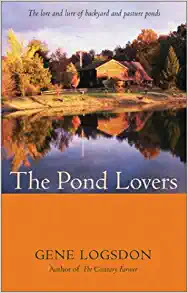As my collection of Gene Logsdon books continues to grow, I am finding that they fall into three general styles. The first is what I would call "The Information Download", where it is Logsdon directly passing practical information and his theories behind them. The second is "The Collection", where it literally is a collection of writings which most likely were articles written for other publications (it is sometimes hard for me to remember he was a regular columnist for years and years as well). The third is a hybrid - let us call it "Information And Others", where it is a combination: some information and philosophy from Logsdon, and then a series of short chapters about how others have applied the theories.
The Pond Lovers falls into this third category.
The book is one part an ode to the ponds in Logdon's life, one part an instructions manual, and one part a discussion of how people apply ponds in their own lives.
The first part - the ode - bookends the text. In the beginning Logsdon talks about the family pond on his family's property -how his father built it and it became a part of their family's life (It appears in other of his works, often referred to as "The Pond at The Center of The Universe"). The last chapter comes full circle, about the pond that he and his children came into and how, in the passing of the generations, it had now become a center of this new generation's life
The second part is how Logsdon applied his knowledge and desire to build his own pasture pond. His detail is a little less than fully instructive (this is one of the complaints about the book in its reviews, a lack of applicable knowledge) but is more than made up for the fact of how he makes observations about what happened at the pond once it was built:
"I have not even tried to identify all the water plants that seem so mysteriously to find the pond. My mind is not big enough to keep track of all of nature's ways on even this one small pond, let alone our small farm. If a plant grows up and sports gold coins, I'll probably learn its name. I'll even learn its Latin name." ("A Pasture Pond")
The third part is actually the bulk of the book, where Logsdon takes us to the places where other people have built ponds, use them, and love them. There are a total of 10 vignettes, small stories of small farms and individuals that have built them and use them in different ways. A couple of the stories - Wyeth's Pond and Jandy's Pond - I know from other writings of his that have involved these places. The others are mostly new to me - but in typical Logsdon fashion he tells us not only about the ponds, but the people who build them, supporting one of Logsdon underlying concepts, that nature and people's lives should integrate into each other instead of being separate, and that we really cannot know the land without the people that care for it and form it - and vice versa.
Would I say this is a "must own" Logsdon book? I would probably put in the "Tier 2/Nice To Have" category. It is Logsdon of course, and so worthy of reading, but it is less likely of book I might consult regularly (unless, of course, I was building or came into a pond).
I would be remiss if I ended this article without a Logsdon story - one of his which, having read in others books is a favorite:
"I think the peak year for Homo hockiatis on the Pond was 1957 (there was a second peak around 1980), when even in February we were all still eager for one more game. Snow had fallen six inches deep on the ice, however, and a warm wind was melting it and the ice. Uncle Lawrence decided the only way to remove the wet snow quickly was with our Allis Chalmers and its manure scoop. Dad did not think much of the idea, but he went along with it. After all, this probably would be the last game of the season.
Since the tractor had little traction on the ice, Lawrence would start out in the grass, careening along in road gear till he got to the Pond, then drop the blade and let the weight of the tractor slide it and a scoopful of snow to the other bank. Luckily, he had decided to clear the shallow end of the Pond first. Halfway through the job, halfway across the Pond, the thawing February ice gave way, and the tractor sank into four feet of water. Lawrence sat astride the seat, whooping hysterically. "You're still the craziest man I know," Dad yelled at him, shaking his head.
"Me crazy?" Lawrence roared with hyenalike laughter. "This is your tractor, not mine!""
("The Pond At The Center Of A Family's Universe")

I finished (and enjoyed) Logsdon's last book he ever published and sometime soon I plan to tackle his most famous book. I've just never been able to read many authors back to back without growing tired so I have spaced out the four Logsdon books I bought among my to-be-read-shelf. Currently I am reading a World War II POW escape story set in the southern Philippines.
ReplyDeleteI am glad you enjoyed it Ed. It is always a pleasure to introduce someone to a wonderful author.
DeleteI do like to vary between books, authors, and genres as well.